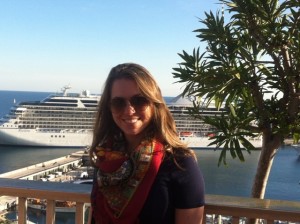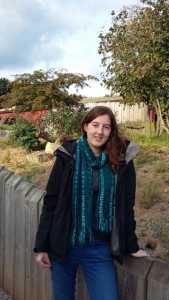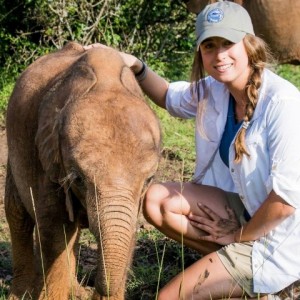The new cohort of students have recently begun their MRes Wildlife Conservation journey and would like to take the opportunity to briefly introduce themselves:
Alexandra Phillips, 26
 Background: I graduated with a Masters of Environmental Sciences (MEnvSci) from the University of Southampton in July 2011, specialising in Biodiversity and Conservation. I studied grassland management, habitat restoration, the impact of non-native invasive species and the ecological impacts of artificial lighting. I then conducted field work on bats for Southampton City Council and some surveys for ecological consultancies.
Background: I graduated with a Masters of Environmental Sciences (MEnvSci) from the University of Southampton in July 2011, specialising in Biodiversity and Conservation. I studied grassland management, habitat restoration, the impact of non-native invasive species and the ecological impacts of artificial lighting. I then conducted field work on bats for Southampton City Council and some surveys for ecological consultancies.
Research Area: I have a special interest in large social carnivores, particularly felids, how environmental variables affect their behaviour and the top-down control they exert over the ecosystem.
Why I Chose MRes Wildlife Conservation: My undergraduate degree gave me a solid base of theoretical ecology, so I chose this course to build on the field skills I’ve acquired through previous work experience. Furthermore I wanted the chance to work with the expert conservationists at Marwell Wildlife and to be at the forefront of conservation.
Aims for the future: I hope to gain the relevant knowledge and experience to move onto either a research or an active career in conservation. I’d like to go on to work with large carnivores, whether they be large social felids or canids and would welcome the chance to continue working abroad.
Arjun Dheer, 25
Background: I earned my Bachelor’s degree in Wildlife Ecology & Management from the University of Maryland, College Park, in 2013. During my time as an undergraduate, I spent a semester in Kenya and Tanzania with the School for Field Studies to learn about wildlife ecology and management and to conduct fieldwork in the region. Since graduating, I have worked at different large carnivore-focused research projects in Botswana and Namibia, conducting direct behavioural observations and indirect monitoring work on African wild dogs, leopards, spotted hyenas, brown hyenas, lions, and cheetahs.
Research Area: My project will be based at Lewa Wildlife Conservancy in Kenya. I hope to study spotted hyenas, as there is limited information on their ecology over much of their distribution in sub-Saharan Africa and I have developed a keen interest in them during my previous work. My project will likely focus on their impact on other predators or ungulates within the conservancy and this will require substantial research into hyena demographics in the area as well.
Why I Chose MRes Wildlife Conservation: This program fits my research interests very well and I believe it is the logical next step in my career. I believe I can learn a lot from this course and in turn I hope to contribute to effective ecology-based conservation work with both Marwell Wildlife and the University of Southampton.
Aims for the Future: I hope to earn a PhD focused on large carnivore ecology and conservation and ultimately start, manage, and/or work for a predator-based research project in sub-Saharan Africa. These species play a key role in the ecosystems they inhabit and often suffer from negative reputations, which in turn puts the odds of their survival over the next few decades in serious jeopardy. The challenge of figuring out ways of coexisting with large carnivores and understanding their ecological needs as apex predators is fascinating to me.
Rebecca Sargent, 26
Background: In 2012 I graduated from the University of Sheffield with an MBiolSci in Zoology. For my undergraduate research project I conducted a lab-based study examining the effect of mutated Exostosin genes on zebrafish behaviour. I also completed a dissertation applying evolutionary theories to human altruism, a subject which I found very intriguing! Since graduating I have spent two years working on conservation projects in Africa. The majority of my time was spent working as a research assistant for the Kenyan based charity Save the Elephants. Here I was able to assist with long term monitoring of the local elephant population and was responsible for managing and updating all fieldwork data.
Research area: My key interests lie in the fields of animal behaviour and behavioural ecology. I hope to conduct my research project at Lewa Wildlife Conservancy in Kenya.
Why I chose MRes Wildlife Conservation: Having a fieldwork component was a key influence on my decision to do the MRes as I am keen to develop my research skills and conduct my own project focused on African mammals. I was also excited by the prospect of working closely with Marwell Wildlife. This course offers more than most standard university degrees in that it allows students to work alongside an active conservation organisation and to carry out research of relevance and practical importance.
Aims for the future: I hope that this course will provide me with the knowledge, skills and experience to become a successful conservation professional. In the future I would like to continue to work in a research capacity within the conservation community, perhaps undertaking or managing research for NGOs and working with local communities to implement conservation strategies.
Clemmie McAteer, 22
Background: I graduated with a BA in Biological Sciences from Oxford University in June 2015. During my third year I focused on animal behaviour and wildlife conservation and my dissertation was a behavioural comparison between wild and captive Squirrel Monkeys. I also completed coursework on the causes of conflict between humans and free living wolves. After I graduated, I spent the summer volunteering for Elephant Human Relations Aid (EHRA) in Namibia, which involved monitoring 3 herds of desert elephants and helping to mitigate the human-wildlife conflict with locals by “elephant proofing” their farms.
Research Area: As I enjoyed studying genetics and evolution at Oxford University I would like to research how animals adapt to new environments and how genetic diversity of translocated or small populations changes. This can be applied to conservation strategies like reintroductions to see how translocated populations adapt after introduction, or during a captivity.
Why I Chose MRes Wildlife Conservation: Conservation has always been my calling and this course allows me to build on the skills I have learnt from Oxford University whilst also specialising. I particularly want to learn more field and practical skills and improve my confidence in statistics. I also think that an 8th month project will be a great insight into research and will help me to decide where I want to direct my future. This course is unique in its access to current conservation projects and contacts, so should be a great stepping stone for my research career.
Aims for the Future: I would like to do a PhD based around genetic conservation and apply the skills I will learn in the MRes to study large vertebrate species that have suffered genetic bottlenecks or have been reintroduced or reinforced. I have particular interest in the family Canidae, such as wolves or African wild dogs which have undergone human persecution in the last few centuries. In the long term I would like to work for an NGO or a government organisation that focuses on reducing biodiversity loss.
Flavia C B Trigo, 23
Background: In July 2012 I graduated with a BSc in Biological Sciences from the University of Sao Carlos. For my final graduation work I developed a dichotomous key to assist in the identification of four tribes that occur in the State of São Paulo, a region located in the Atlantic Forest biome. During my undergraduate degree I also completed internships at Sorocaba Municipal City Zoo, the Aquarium of Ubatuba, NGO ‘Save Brasil’ and Creta Ubatuba, an animal rehabilitation institute.
Research Area: For my research I will be based in the UK. I have a keen interest in the IUCN, the conservation status of birds and the ecology of small mammals.
Why I chose MRes Wildlife Conservation: I chose this course because it is very unique; being a partnership between Marwell Wildlife and University of Southampton, it offers incredible opportunities to work alongside active conservation biologists, to conduct an 8 month research project and to undertake fieldwork in Kenya.
Aims for the future: I hope to become a conservation biologist, working within a NGO or conservation institute to mitigate the human-wildlife conflict, as I believe we have a moral responsibility in conservation.
Rosie Livingstone, 23
 Background: I graduated with a BSc (Hons) in Zoology from the University of Southampton in 2015. For my undergraduate research project I worked in collaboration with Danielle Free, zoologist for Marwell Wildlife (and previous MRes student), and Marwell on the captive breeding programme of Hartmann’s Mountain Zebra (Equus zebra hartmannae) analysing their inbreeding and reproductive behaviour from the EEP Studbook.
Background: I graduated with a BSc (Hons) in Zoology from the University of Southampton in 2015. For my undergraduate research project I worked in collaboration with Danielle Free, zoologist for Marwell Wildlife (and previous MRes student), and Marwell on the captive breeding programme of Hartmann’s Mountain Zebra (Equus zebra hartmannae) analysing their inbreeding and reproductive behaviour from the EEP Studbook.
Research Area: I will be based in the UK focusing on population management of a species present at Marwell, but with wider reaching impacts for European and global conservation.
Why I chose MRes Wildlife Conservation: After working with Marwell on my dissertation I was inspired by the worldwide research and conservation efforts that they are actively involved in and this course allows us to become personally involved in their conservation goals. It also offers fantastic opportunities and the chance to work alongside conservation biologists who are experts in their field.
Aims for the future: I hope to work for a UK-based institution, charity or NGO combining active wildlife research with education to expand our global knowledge of species conservation and survival.
Sian Green, 23
Background: I graduated with a BSc (Hons) in Zoology from the University of Reading in 2014 having completed my undergraduate research project looking at activity patterns of leopards and comparing different data collection methods used for studying medium and large carnivores. During the past year I have spent 3 months volunteering in Costa Rica on a project looking at Jaguar predation on sea turtles and 6 months working on Mafia Island, Tanzania conducting a range of biodiversity surveys.
Research Area: My 8 month research project will take place in Kenya where I hope to continue on from my previous research experience by studying carnivores or other keystone species.
Why I Chose MRes Wildlife Conservation: I chose this course because it offered a unique opportunity to gain field experience, work with an established conservation organisation, learn the skills needed to plan and conduct research and then put all this into practice for my own 8 month research project.
Aims for the Future: I hope to build a career in wildlife conservation doing field research for a conservation NGO with the potential for continuing my own research and studying for a PhD.
Sonny Folliot, 21
 Background: I have recently graduated from the university of Derby with a Bsc (Hons) in Zoology where I conducted my dissertation on the viability of wolf reintroduction in Scotland and its effect on red deer, Cervus elaphus, populations using an individual-based model. Throughout my degree I have been greatly interested in the reintroduction and conservation of large carnivores throughout Northern Europe / North America / Russia, and participated in the study of wolves, bears and lynxes in the Vel’ka Fatra national park in Slovakia.
Background: I have recently graduated from the university of Derby with a Bsc (Hons) in Zoology where I conducted my dissertation on the viability of wolf reintroduction in Scotland and its effect on red deer, Cervus elaphus, populations using an individual-based model. Throughout my degree I have been greatly interested in the reintroduction and conservation of large carnivores throughout Northern Europe / North America / Russia, and participated in the study of wolves, bears and lynxes in the Vel’ka Fatra national park in Slovakia.
Research area: I am undertaking a UK-based project on the concept of re-wilding.
Why I chose MRes Wildlife Conservation: Having the opportunity to work alongside such an important conservation organisation that is Marwell Wildlife and having high-quality lectures taught by leading scientists in their domain struck me as a once in a lifetime opportunity that would enable me to acquire all the necessary tools for the future.
Aims for the future: I would like to pursue my career in the domain of large carnivore reintroduction and conservation throughout the northern hemisphere.
Sushmitha vandana Gopal, 23
Background: I graduated with a Bachelor’s in Chemistry, Applied Botany and Zoology in 2013 (Bangalore, India). My assignments where on keystone species, coral reef formation, research on mating and egg laying behaviour of Pipa, embryo development of chicks and consumption of oxygen in fresh water by crab.
Research Area: My research project will be on population management.
Why I chose MRes wildlife Conservation: I have always wanted to work with wild animals and this course is a uniquely research-based programme which will provide the platform to develop myself as a conservation biologist. It provides international exposure and training which helps to tackle present day conservation issues.
Aims for the future: I hope to pursue a career in research, working towards the conservation of threatened species in India.
Tessa Chesonis, 22
Background: I graduated with a BSc in Fisheries, Wildlife and Conservation Biology with a concentration in Wildlife Science from North Carolina State University in 2015. My undergraduate research focused on wildlife knowledge among children in North Carolina and what kind of role hunting played in that knowledge. During my undergraduate degree, I completed internships at the Seneca Park Zoo in Rochester, New York and the Primate and Predator Project in South Africa.
Research area: I will be conducting my research project based at the Dambari Wildlife Trust in Zimbabwe.
Why I chose MRes Wildlife Conservation: This course offers the opportunity to perform an in-depth research project abroad and work alongside established conservationists.
Aim for the future: I hope to pursue a career in research studying endangered species in Africa, possibly concentrating on human-wildlife conflicts.
Posted By : Kezia Bellamy







One Response to MRes Wildlife Conservation 2015 – Here We Go!